How University of Portsmouth graduate Vanessa Ruck helps empower others and herself as The Girl on a Bike
and live on Freeview channel 276
She collided with a red light-jumping car while on her bicycle, shattering her right shoulder and right hip in the process.
This led to reconstructive surgery and seven operations in as many years.
Advertisement
Hide AdAdvertisement
Hide AdIt was while on her long road to recovery that this adrenaline-loving woman decided to take up off-road motorbike riding, and so The Girl on a Bike was born.
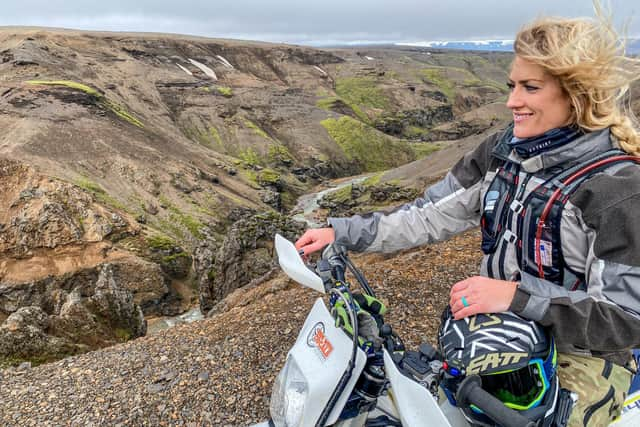

Now Vanessa, an international business studies graduate of the University of Portsmouth, uses her experiences to help inspire and empower her 260,000 followers on social media, in schools and through motivational speaking.
Through her various channels – including Facebook, YouTube and TikTok – she updates her followers on all her exploits, taking the rough with the smooth.
Most recently this included being the first woman to enter, and then complete the gruelling eight-stage Tunisia Desert Challenge – but not without another life-threatening incident.
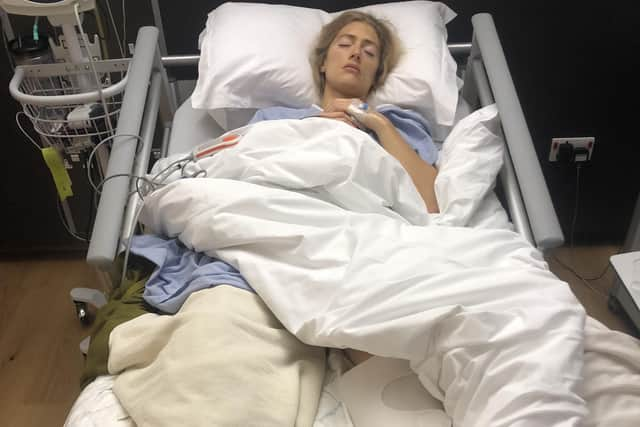

Advertisement
Hide AdAdvertisement
Hide AdDuring the fourth stage, her bike malfunctioned at around 10.30am, and at first Vanessa, 35, was fine.
‘I was pretty chilled out. It was almost peaceful – I was sat in the dunes, I could randomly see and hear other competitors in the distance and there were quite a few vehicles going through.
‘The organisation really is incredible. I can't emphasise enough how good the organisation is far as safety. There's no need to die of heat and dehydration – we have the emergency systems in place. The organisers were spot on.
‘Competitors were stopping to give me food and water, I didn't have shade, but I had my emergency blanket.’
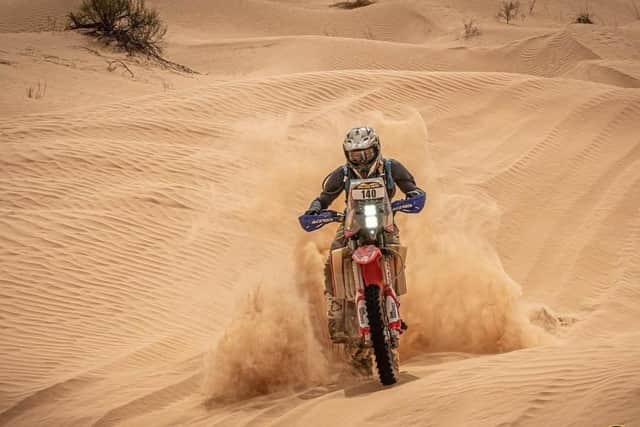

Advertisement
Hide AdAdvertisement
Hide AdHowever the winds began to pick up – to 50mph – and Vanessa was unable to prop her bike up to create a shade – the sand was too soft to dig in. But another vehicle stopped and helped her prop the bike and use a cape to create a bit of shade for her while waiting for sweeper truck at the back of the race to collect her.
Even with nine 1.5l bottles of water and keeping her skin covered from the sun, with the temperature reaching 45 centigrade, as Vanessa says: ‘The body can't handle that heat and intensity for that long.
‘It was when the wind picked up to the point that I couldn't breathe that I was getting panic attacks. My headache was building and there was so much sand.
‘I lay in the foetal position in my little patch of shade and I wrapped this scarf double to make a little air pocket I could breathe in.
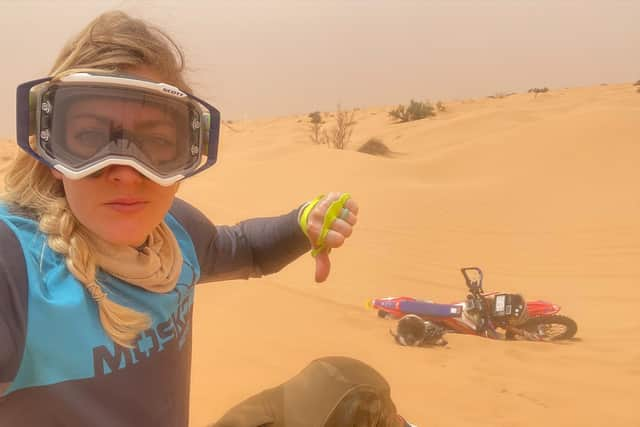

Advertisement
Hide AdAdvertisement
Hide Ad‘Through my accident recovery I've discovered a lot of mindfulness, and it's one of the ways I manage the chronic ongoing pain I have with my hip.
‘Loads of people picture you sitting on the floor humming, I'm not a sitting on the floor humming kind of person – I get itchy feet, I'm not very good at sitting still. Mindfulness has made me more able and more aware to be in control of my conscious thoughts, which leads your subconscious and your emotions directly link to your thoughts.
‘I was lying in the dunes trying to do my mindfulness. I was lying there going: “Right, Vanessa, you're fine”, and I'm like: “I'm not fine. I'm in the desert on my own, and my head feels like it's going to implode”. And I could hardly breathe because of the sand. I knew they were coming for me but I didn't know when.’
Advertisement
Hide AdAdvertisement
Hide AdAnd she still convinced herself: ‘I wasn't a medical emergency, I hadn't called for help, I wasn't bleeding, I wasn't broken. I was just hot.’
But the panic attacks kept coming, and it was then that Vanessa decided to press the help button, bringing aid to her via GPS location, but even that wasn’t simple in her addled state.
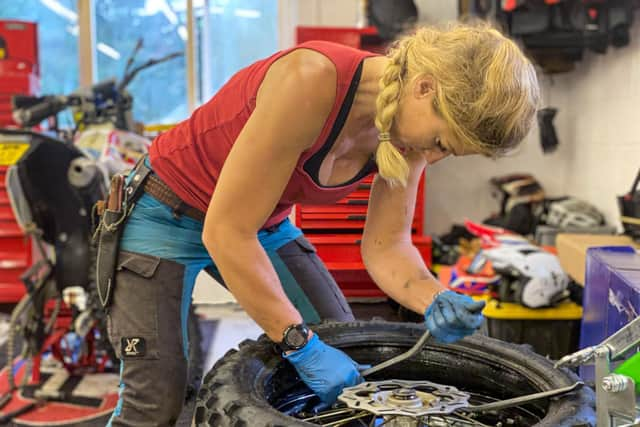

‘The psychological mind game of pushing that button was unbelievable.
‘I realised that when I decided to hit that button, I couldn't actually walk around my bike, I had to crawl around because I was such a mess. I stared at it, I put my finger on it but I couldn't press it because I wasn't an emergency, I was just sat in the desert, really hot.
Advertisement
Hide AdAdvertisement
Hide Ad‘Then I pressed it and I panicked. You have to hold it for five seconds, so I held it for about three and freaked out, and then I was like: "Come on, I need help. Someone died before because they didn't press it.”’
So she pressed and a helicopter came within half an hour. But then it disappeared.
‘That's when I had the worst panic attack I've had in my life – I couldn't breathe, my heart rate was racing.
‘Maybe 10 minutes later I hear a voice and feel two hands on my back and it absolutely scared the life out of me.
Advertisement
Hide AdAdvertisement
Hide Ad‘The helicopter couldn't land next to me – the closest they could land safely was 492m away – we checked on the map afterwards. This poor medic had to pretty much drag me through the dunes.’
At the camp she had three bags of fluid put in her by IV drip.
‘The medics were amazing. I went back to my bivouac later and had nightmares through the night. My bike got recovered the following day, so I couldn't ride that day, and medically there was no way I should. But the following night I woke up with the worst night terrors of being stuck in the desert – I was like, that's it I'm done, I'm retiring from the race.
‘I'd obviously bitten off more than I can chew.’
However: ‘I woke up in the morning and was like: where's my bike? And back off into the desert I went.
‘It's the hardest thing I'd ever done.
Advertisement
Hide AdAdvertisement
Hide Ad‘Until that my day my accident recovery was the hardest thing I've ever been through, and now I feel like I've taken back control. Now the hardest thing I've ever done is something I chose, and there's something really empowering about that.’
For anyone who thinks the bike does all the work, Vanessa explains: ‘It’s insanely physical, and you are mentally and physically engaged, it's constant dynamic and shifting changing of the terrain and you're following a paper scroll on your handlebars.’
‘My motorcycle journey has been a very random one of constantly trying to put myself outside of my comfort zone, because that's the only place where we really ever grow.
‘You have to put yourself into fear for growth, and that's how you get better at things.’
Advertisement
Hide AdAdvertisement
Hide AdWhile Vanessa began riding about six years ago, the endurance, rally side is a more recent addition – she tackled her first, Valleys Xtreme in the Welsh valleys in January 2020.
‘That was the start of this whole: "Hm, I quite enjoy this disgusting painful race scenario...”’ she says with a laugh.
‘Before my husband and I had even made it home from that race, we'd come up with the idea to enter Red Bull Romainiacs,’ a race series in Romania.
From there it was the Qatar Rally, her first desert race. ‘It was brutal but just so much fun – 45 per cent of the riders finished and I was one of those.’
Now she really has the rally bug.
Advertisement
Hide AdAdvertisement
Hide Ad‘Psychologically, when I try and break it down, in those race conditions, there is no capacity for anything else.
‘Sat here right now, I can feel my hip pain, it's there, I live with it.
‘There’s a 95 per cent certainty that I'm going to need more surgery, but I can't just sit on the sofa. That would be worse for my mental health, if I didn't get out there and try to make the most of every day.
‘But when I'm riding I just feel really alive and in my element.’
Advertisement
Hide AdAdvertisement
Hide AdWhile her husband rides with her on some races, he has no desire to do the desert races.
‘I've unfortunately caught the rally virus, and even before I'd finished Tunisia I was trying to work out what my next rally would be. Which is crazy when you consider I've had some sort of PTSD processing in me.’
Since her accident and creating The Girl on a Bike, Vanessa has avoided ‘playing the victim card,’ but is also keen to portray her life, warts’n’all on social media.
‘Social media can be very toxic because people only share the two per cent which is shiny and amazing, “look how glamorous life is”, but life isn't like that, we all have battles and struggles and challenges.
Advertisement
Hide AdAdvertisement
Hide Ad‘I'm on a mission to share mine as much as possible in the hope that even if one person gets something out of it, it makes what I've gone through worthwhile, somehow. It helps me process what I've been through.
‘It's why I'm doing the schools programme, I'll go into any school which will have me totally for free and deliver workshops on some of my key learnings about processing anxiety, stress, fear, resilience, goal-setting, understanding it's normal to want to give up.
‘I think I've spoken to about 5,000 kids so far.’
Now living in Wye Valley, near Monmouth, Vanessa has been doing Girl on a Bike full-time for two-and-a-half years – quitting her career in communications and marketing.
‘It wasn't about money, a massive part of it was mental health. I had about 45,000 followers when I quit my job, and my first month I earned £100. It wasn't about that – I needed time to process, and for rehab, my hospital appointments.
Advertisement
Hide AdAdvertisement
Hide Ad‘If you told me six years ago when I started Girl on a Bike that I'd be doing it full-time, I would have choked on my drink – I wouldn't have believed it.
‘But as I've shared my story and started to be more and more open, it makes you pretty vulnerable when you share everything, but I never realised it would help so many people. And somehow helping them helps me, and it's got this lovely energy of trying to give something good to the world.
‘I've never worked as much as I do now, but it's incredibly rewarding.’
She has also had to battle stereotypes.
‘I'm very often judged by my appearance. I've got naturally long eyelashes, I'm blonde, I obviously don't know how to ride’, she says sarcastically, ‘and I'm just there to try and look pretty with a motorbike.
Advertisement
Hide AdAdvertisement
Hide Ad‘Seriously, when I’m riding, there's nothing about trying to look pretty right now!
‘I think I have to work extra hard to be credible, to learn about the engines, to be able to have a conversation and an opinion, and I get people going: "Oh you know about that?” Well yes, I'm a motorbiker too.
‘I have a lot to learn still, but I'm getting that ability, and when I can overtake a guy who's judged me before, it's a little bit satisfying.’
For more information and links to her social media, go to thegirlonabike.com.
Comment Guidelines
National World encourages reader discussion on our stories. User feedback, insights and back-and-forth exchanges add a rich layer of context to reporting. Please review our Community Guidelines before commenting.
